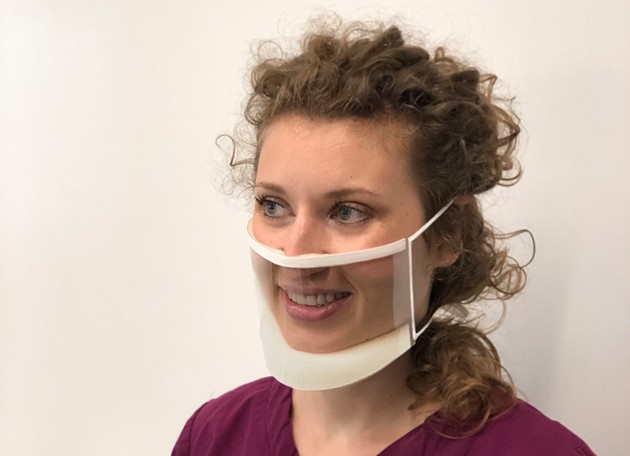The masks will help people who are deaf or have hearing loss who rely on lipreading and facial expressions
Northern Ireland has received 12,000 clear face masks to improve accessibility for patients who are deaf or have hearing loss.
The masks are see-through and have an anti-fogging barrier to ensure the face and mouth are always visible to help doctors, nurses and carers communicate better with their patients.
The masks are part of a UK-wide order of the ClearMask™ product and have been approved by the Public Health Agency and Health and Social Care Board’s Infection Prevention and Control Cell for use in Health and Social Care organisations.
The Protocol for Use of the ClearMask™, which has been distributed to health and social care (HSC) organisations, highlights that The ClearMask™ product is not a substitute for a fluid resistant surgical mask. It cannot be used in surgical settings or for invasive procedures, however it may be suitable in some situations following a risk assessment.

Charity RNID has been working with governments across the UK to ensure that health care services are accessible to patients who are deaf or have hearing loss during the coronavirus pandemic.
Claire Lavery, RNID’s Northern Ireland Director, said: “The coronavirus pandemic has presented many barriers to the one in five people in Northern Ireland who are deaf or have hearing loss. Many people with hearing loss rely on lipreading and facial expressions, which is impossible when someone is wearing personal protective equipment (PPE).
Since the outbreak of coronavirus, people have told us continually that they are worried about communicating in health and social care settings where face masks are now in constant use. We know that clear masks have the ability to reduce barriers for both patients and staff across HSC services, and we’re delighted that these masks have now been approved for use across Northern Ireland.”
A small stock of the clear masks has been distributed to each HSC Trust, alongside guidance for staff on how to improve communication with deaf patients. This includes information on booking sign language interpreters and using speech to text apps.
RNID also wants to raise awareness of the clear masks amongst people who are deaf or have hearing loss, so they can suggest that their healthcare worker wears a clear mask to help them communicate.
A Department of Health Spokesperson said: “With the receipt of these 12,000 ClearMasks™, a staff protocol for their use has been developed. Given the significant global demand for clear masks we are liaising with a wide range of health professionals including those working in speech and language therapy and audiology in exploring various options to work with local manufacturers to develop a product which will meet clinical standards.”
Alliance MLA Kellie Armstrong – who is partially deaf – has been campaigning for months for clear face masks to be used where possible to help those who lip read.
She said: “This is a welcome move and will make a real difference to many people – those who are deaf, some with learning disabilities and many older people – all of whom rely on lip reading to communicate.”
“Getting used to face coverings is a massive culture change, one that has been made more difficult for those who need to see someone’s face to communicate. This equipment will help us do that, while still remaining safe for our health workers.”
Face coverings and social distancing requirements for the general public have had a massive impact on the one in five people in Northern Ireland who have hearing loss and rely on lipreading and facial expressions.
Claire Lavery said: “People need to be aware of the exemptions and how they apply to people who are deaf or have hearing loss, and think about how they communicate to be inclusive of everyone. You do not need to wear a face covering if you are providing assistance to someone who relies on lipreading – this means you can temporarily lower your face covering whilst maintaining social distancing to help someone to communicate. Individuals and organisations can also help by reducing background noise and moving to a quieter area, rephrasing sentences if the person doesn’t understand and writing things down.”
ENDS
Contact us
If you are deaf, have hearing loss or tinnitus and need free confidential and impartial information and support, contact RNID.
We’re open 8:30am to 5pm, Monday to Friday.
Notes to Editors
· RNID is encouraging organisations and individuals to adopt its communication tips to make life more inclusive for deaf people and those with hearing loss
· The ClearMask™ product has been approved for use in HSC organisations in line with a Protocol for Use of the ClearMask™
· The Protocol for Use of the ClearMask™ highlights that the ClearMask™ product is not a substitute for a fluid resistant surgical mask, but may be suitable in some situations following a risk assessment
· A risk assessment must always be undertaken
· When using the ClearMask™ product, the principles of maintaining social distancing and good hand hygiene still apply.
· RNID was founded in 1911. For more than 100 years the charity has pioneered new treatments for hearing loss and tinnitus. It has promoted access to sign language and subtitles, brought in free hearing tests for new-born babies, worked with technology for cochlear implants and developed techniques to help people cope with tinnitus.
· Our infoline offers free confidential and impartial information on a range of subjects related to hearing loss and tinnitus. We can also deliver talks to organisations about communicating effectively with deaf people and those with hearing loss during the pandemic.
Contact us
If you are deaf, have hearing loss or tinnitus and need free confidential and impartial information and support, contact RNID.
We’re open 8:30am to 5pm, Monday to Friday.